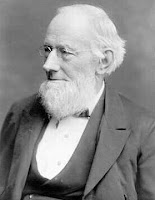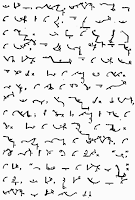 |
| Birmingham and Midlands Institute on Paradise Street |
 |
| Issac Pitman |
Our speaker was one of the foremost authorities on the subject of Phonography, Marie Bethell Beauclerc. She told the audience her story, not to brag, but to point out that anyone can learn this system. Born 1845, Miss Beaucler had to quit school at nine due to family finances (her father had died a few years before.) Despite her scant formal education, she had already gotten proficient enough in reading and writing to continue her studies on her own.
 |
| Pitman's Phonography |
When Beauclerc was eighteen she got her first job. She was hired by a Mr A. H. Hagarty, to record his lectures on phrenology while in Birmingham. Soon she received other offers from ministers and lecturers to record their presentations. Victorians love reading lectures and sermons, but many public speakers are more articulate when talking and horrid when trying to write it down. Word got around about this young woman’s talents. In 1871 the Birmingham Morning News hired her as a shorthand reporter, making Beauclerc England’s first woman reporter. (Yes, I know Jessie White Mario beat her, but she was a freelance journalist.)
 |
| Marie Bethell Beauclerc |
The majority of the audience tonight were men. Most stenographers and typists are currently male. However I noticed the young women in the audience were all sitting on the edge of their seats. If Birmingham’s leading phonographer was a woman, why couldn’t they learn it and get a better job than domestic service? Indeed by the twentieth century most stenographers and typists will be women, and historians credit Miss Beauclerc as being instrumental in that.
Seven years from now, Miss Beauclerc will be appointed teacher of shorthand at the prestigious Rugby School. Not only will she be the first shorthand teacher in an English public school, she will be the first female instructor in an English boys' public school! Sadly in 1892 she will be forced into retirement due to illness. She will pass away in 1897 at the tender age of fifty-two. Still that’s sixteen years in the future. Right now she was very much alive as she spoke to us of her chosen occupation.
The Victorian Age was the time when women started making strides in equality. Most of these pioneers are being met with hostility and have to fight their way into their chosen profession. And a lucky few are just so amazingly proficient at what they do that only a fool would ignore them. Marie Bethell Beauclerc is one of these masters--or should I say--mistresses of their art.




No comments:
Post a Comment
Due to bots sticking ads into the comments I am now forced to moderate. Differing opinions are welcomed. This is history, which is the surviving written record, which may or may not be accurate. I will even allow comments pushing other books or websites as long as they are relevant.